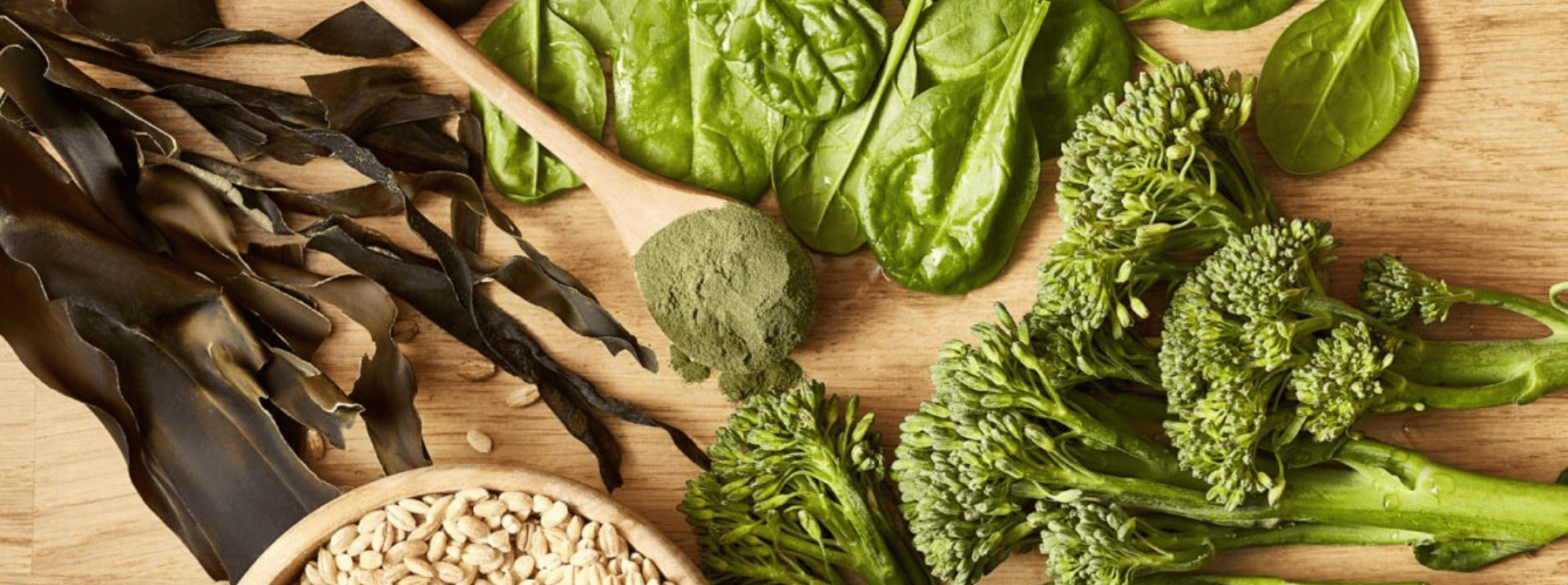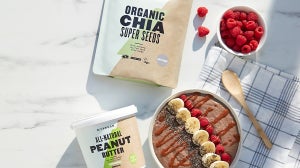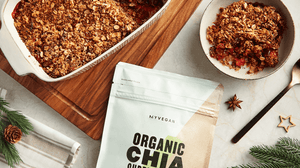
The term "superfoods" is more than just a trendy buzzword. It describes a type of nutrient-dense food that can have various health benefits due to their high concentration of antioxidants, vitamins, and minerals.
Superfoods are often fruits, vegetables, mushrooms, grains or seeds. They provide significant amounts of essential nutrients needed for your health and wellbeing.
In this article, we’ll dive deeper into the world of superfoods, exploring their benefits and highlighting some of the best ones you should consider incorporating into your diet.

What Are Superfoods?
Though not scientifically defined, the term superfoods is used to highlight foods that are particularly rich in nutrients and beneficial to our health. They are foods that contain a high volume of minerals, vitamins, and antioxidants, giving you more nutritional bang for your buck.
Superfoods have been recognised for their potential health benefits, and improving overall wellness (1).
However, it is essential to remember that while superfoods are a healthy addition to your diet, they should be part of a healthy, active lifestyle that includes a variety of foods (2).
Benefits Of Superfoods
Here are the top 5 ways that superfoods help support your everyday health:
1. Nutrient density
Superfoods are loaded with essential nutrients that our bodies need to function. These include vitamins and minerals that play a crucial role in everything from bone health to the function of our immune system.
They also contain antioxidants, compounds that help protect our cells from damage by neutralising harmful free radicals in our bodies (3).
2. Enhanced immunity
Many superfoods, such as citrus fruits and dark leafy greens, are rich in antioxidants and other immune-boosting nutrients like vitamin C and vitamin B6.
These help strengthen our body's natural defences against illnesses and infections (4).

3. Heart health
Foods rich in omega-3 fatty acids, such as chia seeds and walnuts, and those high in fibre, like whole grains and legumes, can help lower cholesterol levels and keep your heart healthy (5).
4. Energy levels
Because superfoods are nutrient-dense, they’re a great source of sustained energy. Complex carbohydrates, like those found in whole grains, provide a slow-release energy source that energises us throughout the day.
5. Gut health
Many superfoods are high in dietary fibre, also called prebiotic fibre, which aids in maintaining a healthy digestive system. So, if you need a diet that supports gut health, it might help to eat high-fibre superfoods.

10 Best Superfoods
There’s often a misconception that all superfoods are expensive or hard to find. But many everyday foods, like broccoli or oats, are also considered superfoods.
These superfoods offer a unique blend of nutrients, and their consumption can significantly improve overall health when combined with a balanced diet and healthy lifestyle.
Look out for blends or mixes of superfoods too, as these have multiple nutrient-dense ingredients and may be more budget friendly than buying individual superfoods.
For example, organic muesli or granola often contain barley, oats and a mix of nuts and seeds. You can also get powdered superfood blends (with greens like spinach and kale) that add a nutrition boost to drinks, salad dressings and more.
1. Barley
Barley is a nutrient-rich cereal grain known for its high fibre content. Its consumption has been linked to improved heart health and better blood sugar control. Eating barley can also support healthy digestion due to its rich fibre content (6).
2. Broccoli
Broccoli is packed with vitamins A, C, and K and fibre, as well as antioxidants.
3. Cacao
We all love chocolate, but did you know that cacao contains antioxidants and essential minerals like magnesium and iron? It’s known for its mood-enhancing properties and potential benefits for cardiovascular health. Its rich antioxidant content may help to reduce inflammation and improve heart health (7).
4. Camu Camu
This South American superfruit contains vitamin C, supporting immune function and skin health. It is also a powerful antioxidant, helping to combat oxidative stress in the body (8).
5. Flaxseeds
Flaxseeds are a good source of omega-3 fatty acids and fibre. These nutrients can improve heart health, improve digestion, and support hormonal balance (9).
You can buy whole flaxseeds, which are great sprinkled over cereals and salads, or as a powder to use smoothies and baked goods.
6. Ginseng
Ginseng is renowned for its potential to boost energy levels and support immune health. Some studies suggest it may also enhance cognitive function and fight inflammation (10).
7. Oats
Oats are rich in fibre, especially beta-glucan, a soluble fibre that can help regulate blood sugar levels, lower cholesterol, and promote gut health (11).
8. Kale
This dark leafy green is packed with vitamins A, K, and C and is a good source of calcium for bone health. It's also rich in antioxidants.
9. Spinach
Spinach is a nutrient powerhouse, full of vitamins A, K, folic acid, and iron. It benefits eye health, reduces oxidative stress, and may help keep your heart healthy (12).
10. Spirulina
This blue-green algae is a protein-rich superfood with various nutrients, including B vitamins, iron, and manganese. It’s also high in antioxidants, which can protect against oxidative damage (13).
Talk To Your Doctor
Before making any significant changes to your diet, speaking with your doctor, qualified nutritionist or other health professional. They can provide personalised advice based on your specific needs and health conditions.
Take Home Message
While the term "superfood" might sound like it belongs in a comic book, it is simply a way to identify nutrient-rich foods that offer significant health benefits. By including these foods in our daily diet, we can harness their nutritional power for better health.

FAQs
What is a superfood?
Superfoods are nutritionally dense, packed with a high level of vitamins, minerals, antioxidants, and other nutrients that have substantial health benefits.
What are the benefits of superfoods?
Superfoods offer a range of benefits due to their nutrient-dense profiles. They have been associated with preventing and managing several health conditions. For example, the fibre in many superfoods can aid digestion, prevent constipation, and help with weight management. And omega-3 fatty acids in certain superfoods benefit heart and brain health.
Is it OK to eat superfoods every day?
Yes, it is a great idea to incorporate superfoods into your daily diet. Making superfoods a regular part of your meals can maximise their health benefits. However, it is vital to remember that balance and variety are essential. No single food, even a superfood, can offer all the nutrition, health benefits, and energy we need to nourish ourselves. Over-reliance on any single food could potentially lead to nutrient deficiencies.
It is always a good idea to consult a nutritionist to understand how to best incorporate these foods into your diet.
What are the best superfoods to eat?
The answer to this question largely depends on your health goals, dietary needs, and preferences. Some commonly recognised superfoods include leafy green vegetables like kale and spinach, berries like blueberries and strawberries, nuts and seeds, whole grains, and other foods such as broccoli, cacao, flaxseeds, and more.
- Chang, S. K., Alasalvar, C., Shahidi, F., & Zhang, Y. (2019). Superfruits: Phytochemicals, antioxidant efficacies, and health effects–A comprehensive review. Critical reviews in food science and nutrition, 59(10), 1580–1604. https://doi.org/10.1080/10408398.2017.1422111
- Wu, X., Gu, L., Prior, R. L., & McKay, S. (2004). Characterisation of anthocyanins and proanthocyanidins in some cultivars of Ribes, Aronia, and Sambucus and their antioxidant capacity. Journal of Agricultural and Food Chemistry, 52(26), 7846–7856. https://doi.org/10.1021/jf0486850
- Rizzo, N. S., Jaceldo-Siegl, K., Sabate, J., & Fraser, G. E. (2020). Nutrient profiles of vegetarian and nonvegetarian dietary patterns. Journal of the Academy of Nutrition and Dietetics, 113(12), 1610-1619. https://doi.org/10.1016/j.jand.2013.06.349
- Chandra, R. K. (2013). Nutrition and the immune system from birth to old age. European journal of clinical nutrition, 56(3), S73-S76. https://doi.org/10.1038/sj.ejcn.1601492
- Kris-Etherton, P. M., Harris, W. S., & Appel, L. J. (2002). Fish consumption, fish oil, omega-3 fatty acids, and cardiovascular disease. Circulation, 106(21), 2747–2757. https://doi.org/10.1161/01.CIR.0000038493.65177.94
- Zhang, G. (2018). Barley as a green factory for the production of functional flavonoid glycosides. Frontiers in plant science, 9, 30. https://doi.org/10.3389/fpls.2018.00030
- Crichton, G. E., Elias, M. F., & Alkerwi, A. (2016). Chocolate intake is associated with better cognitive function: The Maine-Syracuse Longitudinal Study. Appetite, 100, 126-132. https://doi.org/10.1016/j.appet.2016.02.010
- Inoue, T., Komoda, H., Uchida, T., & Node, K. (2008). Tropical fruit camu-camu (Myrciaria dubia) has anti-oxidative and anti-inflammatory properties. Journal of cardiac failure, 14(7), 630-636. https://doi.org/10.1016/j.cardfail.2008.02.009
- Caligiuri, S. P., Aukema, H. M., Ravandi, A., & Pierce, G. N. (2014). Flaxseed consumption reduces blood pressure in patients with hypertension by altering circulating oxylipins via an α-linolenic acid-induced inhibition of soluble epoxide hydrolase. Hypertension, 64(1), 53-59. https://doi.org/10.1161/HYPERTENSIONAHA.114.03179
- Rastogi, S., Abid, A., & Mishra, N. (2015). Traditional herbs: a remedy for cardiovascular disorders. Phytomedicine, 23(11), 1082–1089. https://doi.org/10.1016/j.phymed.2015.10.012
- Rebello, C. J., O’Neil, C. E., & Greenway, F. L. (2016). Dietary fibre and satiety: the effects of oats on satiety. Nutrition Reviews, 74(2), 131–147. https://doi.org/10.1093/nutrit/nuv063
- Steffen, Y. (2018). Cellular targets for the beneficial actions of tea polyphenols. American Journal of Clinical Nutrition, 98(6), 1642S-1650S. https://doi.org/10.3945/ajcn.113.058230
- Karkos, P. D., Leong, S. C., Karkos, C. D., Sivaji, N., & Assimakopoulos, D. A. (2011). Spirulina in clinical practice: evidence-based human applications. Evidence-based complementary and alternative medicine, 2011. https://doi.org/10.1093/ecam/nen058









